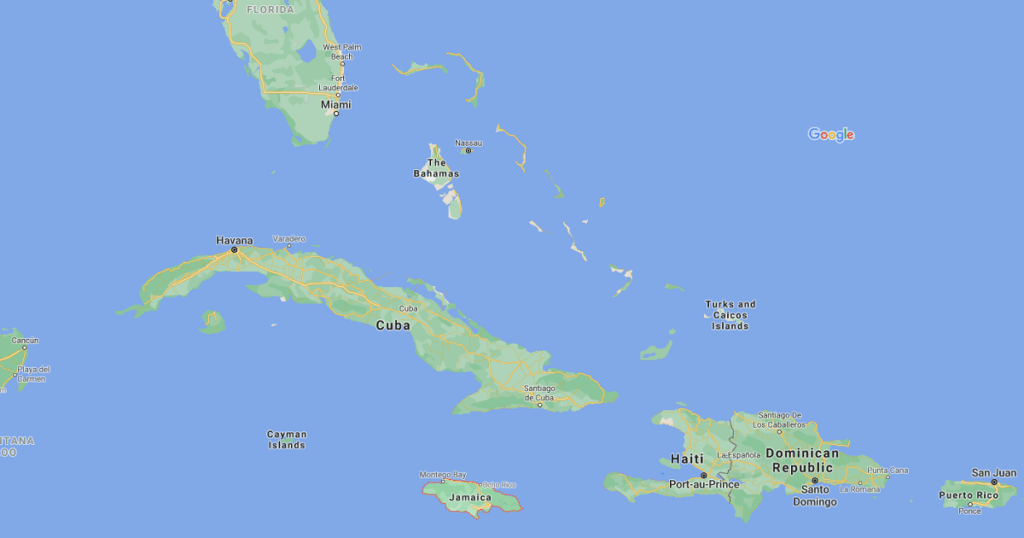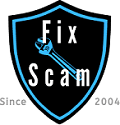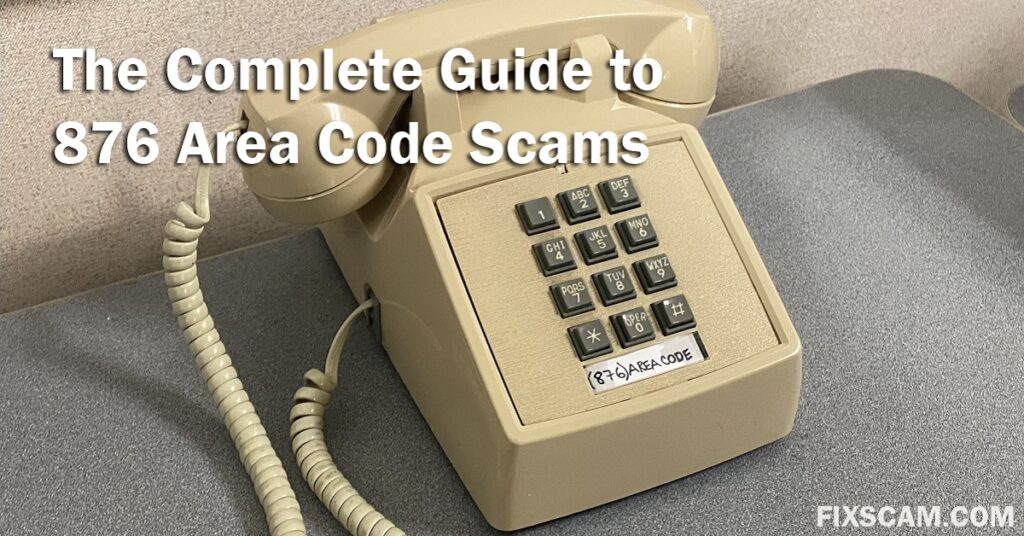Phone calls from the 876 area code are scams. If you received a call like this, you are not alone. Every year thousands of people receive these calls from scammers trying to swindle them into sending money. This article explains how these schemes work, how to spot and avoid them, and what to do next.
Start blocking wanted calls with RoboKiller.
Phone calls from the 876 area code come from Jamaica and are most likely a scam. Scammers commonly claim the call taker won the lottery or another prize and need to first pay taxes. Do not answer calls from the 876 area code or hang up when you realize the scam.
Table of Contents
How the 876 Area Code Scams Work
The type of scams used by callers from the 876 area code fall under the category of social engineering. Instead of hacking into bank accounts, they convince people through conversation to willfully send them money. Some common threads among these lies are the scammer’s attempts to have victim wire transfer money. They also ask for prepaid card codes purchased from a local pharmacy or big box store.




These scams do work, and people have lost thousands of dollars as a result. Maybe you work at a business that sells gift cards or handles money transfers. If so, please take interest in especially older people when they are making large purchases or transfers. Most people will not have the courage to get involved or intervene. But you just might be preventing someone from losing their life’s savings.
According to an AARP survey, 55 percent of senior citizens failed a quiz about fraud. [1] This means they are much more vulnerable to fall for a scam.
How Scammers Gain Trust to Be More Successful
Scammers often purport to be affiliated with a government agency such as the FBI, IRS, or TSA. I even have a full article answering will Social Security will contact you by phone. They do this to build credibility and make their story more believable. Especially people from older generations tend to have more faith and respect for authority figures. Scam artists know this and use it to their advantage.
Never believe anyone on the phone who says they are from one of these large government agencies. It is much more likely these government bodies will send you something in the mail. It will be relevant to you, and will not be asking for money for personal information.
Common Scenarios
Here are some common examples of what you might expect to hear from these scammers. A popular story you may hear relating to 876 area code scams is the caller is from Publisher Clearing House. The voice on the phone says you won some unbelievable about of money. I have heard ranges anywhere from $500,000 to 2 million dollars!
If you are not familiar with the legitimate PCH company, they do in fact give away money in a sweepstake. They even send a host and camera crew to your door with a large oversized check.
The fraudulent calls continue by requesting you to pay taxes or other fees first before you can receive your winnings. In my experience, this figure ranges greatly from $100 to a few thousand dollars. If you are unlucky enough to send this first fee, there’s a surprise. It is never enough.
Once you send the money, the scammer knows you fell for the scam. Now the scammer will make up another excuse why you need to pay more money. This continues until the victim becomes alerted to the scam.
Personal Experience with These Scammers
One scammer told me they were from the United Parcel Service (UPS). They said that even though I had not ordered a package, I had won. They wanted to know if I was going to be home for them to deliver it. The scammer said on the phone it would cost me over a hundred dollars to accept the mail. I have also heard similar accounts from dozens of other people.
This story is interesting to me specifically because I frequently received packages. The major difference is I am always expecting them and will never pay upon their delivery.
More Things Scammers Might Say
A less popular ruse is for 876 area code scams is to claim to be from Apple. They then give some variation of a story about their AppleCare warranty service. In most of these scenarios, the warranty is in danger of lapsing. And only by sending the scammer money immediately will you avoid your service from expiring or being canceled.
This story may sound plausible to some. That’s why it works, and that is why these scammers continue to use this story. Always verify you are talking directly to the actual company.
Some of these scenarios involve meeting someone at the bank or someone coming to your door to deliver a prize. I have heard concerns from people about their safety. Keep in mind, these thieves are only interested in your hard-earned money. Most statements made about in-person contact are only to further the ruse or make their story more believable.
There are seemingly endless stories scammers use to perpetrate 876 area code scams. Every day scammers are adapting and changing their cover story as people start to catch on to the old ruse. The big takeaway is never to send money to someone who calls you on the phone.
How Can I Tell a Phone Call is a Scam?
- Training and Experience
- Unsolicited Communication
- Too Good to Be True
- Lack of Validation
- Inconsistencies
- Unprofessionalism




Training and Experience
By reading this article and others like it at FixScam.com is a good start. You are already on your way to quickly and efficiently identify scams. By reading about commons stories scammers use and then receive a call with a similar story, you spot the fraud.
Here is another one of your articles that answer the question if you should pick up calls that don’t show up on caller ID.
When you learn common things to look out for, the red flags start to make the scammer’s stories less effective. It is likely you have already received calls from fraudsters. Based on that experience, you are unlikely to fall for the same call in the future.
Unsolicited Communication
There is a saying that ‘You can’t win if you never entered’. It is not possible to win a lottery in which you did not participate. Furthermore, organized crime rings will often use a database of phone numbers and call at random. If you are not expecting a call from a company but receive one out of the blue, it should be suspicious. However, if you just purposely signed up for a service and the same company calls you the next day, it is less suspicious.
In that case, the content of the call is more telling. Be wary of calls from companies with which you do not typically do business. If Apple calls you about your AppleCare warranty and you do not own an iPhone or other Apple product, this is a red flag.
Too Good to Be True
If it sounds too good to be true, it is. One of the strings that criminals involved in social engineering scams pull is an appeal to greed. They put the idea of a large amount of money on a hook and dangle the line in front of needy and greedy people. Scam artists know that sometimes the promise of millions of dollars the resulting financial freedom can be too much to resist.
The reality is the victim will never see this money and will be even poorer once the con is completed. People are better served financially by investing or saving the money they would otherwise send to someone to collect a supposed prize.
Lack of Validation
Try to validate you are speaking to the actual business the unknown caller claims to represent. One of the ways you can do this is to look up basic information on the company’s website. For example, the caller ID of the phone number indicates it is from the 876 area code. The caller states they are from Publishers Clearing House.
You go to the PCH website and see they are based out of New York in the United States. This company would not be calling you from Jamaica. The phone number on their website will not match the number that called.
You can also find phone numbers from legitimate companies by searching for their website through Google. Consider calling the customer service number listed on their site and start asking questions. Another route would be to check any past emails you have received from this business. If you have an online account with the company already and the caller says there is a problem, log in and check.
Finally, when in doubt reach out to family members or friends and ask for advice. They may have more knowledge or a personal experience that may help you decide.
Inconsistencies
Here are some common inconsistencies to look out for. The person who calls you should know who they are calling. If you ask the scammer for the name of the prize winner, they should know it. They may not know because they only have your phone number. They could also provide the wrong name if the name on your phone bill is your spouse or parent.
Sometimes they get lucky and will know your name. This does not mean it is not a scam, this information can be obtained through various public information sources. It also does not mean they have personal information about you that you should be concerned about.
Take notice of the time of day you are receiving the call. The 876 area code is in the Eastern Standard Time (EST) time zone which is UTC -5. If you live in a different time zone, it may be the middle of the day for these scammers. At that time, it could be the middle of the night for you. Furthermore, an unknown caller could report being from a local business in your area. It is very questionable if the call is not during normal business hours.
Also, ask yourself if it is a holiday such as Thanksgiving. Think of other holidays observed by your area (but not in Jamaica). This would be a time when the real business is most likely to be closed.
More Inconsistencies
A few more of the common inconsistencies I have heard of are as follows. Most scammers do not understand the true working of a corporate business environment. They should have a basic understanding of the typical organizational structure. They should be familiar with the positions of CEO, CFO, and relevance of a Human Relations (HR) department.
Since most scammers are calling from another country, accents and poor grammar are not unusual. Sometimes they attempt to hide this, but it becomes much more apparent if they become agitated. An accent is just one small factor to keep in mind if speaking with someone saying they are local to your area. Never judge someone based solely on their nationality.
Sometimes it is telling to test callers on their knowledge. Asking simple questions such as where they are located or where they believe you are is a good one. Because they sometimes guess this information based on the area code of your phone number, they can often be wrong. A legitimate company should be able to answer some basic questions. They should do this without much hesitation and as reference above, they would not become angry as a result.
Unprofessionalism
Another red flag is the level of professionalism of the caller. Most legitimate companies harp on being nice and courteous on the phone. A customer service representative should not be rude or threatening. This is something that I commonly hear the opposite about these scammers.
When they are questioned or confronted with their inconsistencies, they can use profanity or mention violence. One time a scammer tried to yell at me for wasting his time. I got a good laugh at that one. An employee of a real business, especially a major corporation or government agency is less likely to become flustered or agitated when questioned.
In addition to having higher standards for employees, good businesses follow good business practices. On the contrary, scammers can be very pushy making you feel rushed. They may try and make you panic so you do not think too much and discover the deception. Some fraudsters are so persistent they will keep calling you back.
They may do this even when you tell them to stop contacting you and hang-up on them. Receiving an unreasonable about of calls from the same or similar number is also a bad sign. Some people have reported dozens of unknown calls a day by the same scammer. This is some behavior that should stand out as not normal for a real company.
More Signs of a Phone Scam
Most people are creatures of habit and do not like change. When it comes to a questionable unknown call, try to spot any changes in plan or information. If you speak to a scammer and call them back at the same number the next day, make sure their name or the name of the company they claim to work for didn’t change. Scammers often must change their aliases to avoid law enforcement and so victims do not recognize the scheme.
They have also been known to change their plans often to either avoid detection or to try and complete the scam faster. They may say the supposed prize money must be claimed that day. However, if the victim can only send the money the next day, but appears willingly, the scammer may change the plan if they sense success is near.
Finally, use common sense. If something just does not seem right, do some investigating. Sometimes the more clarifying questions you ask, and the longer you simply listen, the more mistakes a scammer can make. I do not believe or trust anyone on the phone. They are just a voice and unless you are one hundred percent sure, it is just a guess as to who you are really talking to.
What Phone Numbers are Associated with 876 Area Code Scams?
The time of day you might expect a call associated with 876 area code scams varies. Because they are calling from another country such as Jamaica, they may be calling from a time zone that differs from yours. The time zone of Jamaica is Eastern Standard Time (UTC -5). [2] While there are multiple time zones that cover the United States, all of Jamaica falls under the EST time zone.
I bring this to your attention because it may give some insight into generally when to expect calls from Jamaica’s area code.
Also, note that the 876 area code is not a toll-free number such as an 800 number. You would be responsible for any applicable charges or service fees for calling or answering.
Table of Common 876 Phone Numbers Used for Scams
| 876-029-6177 | 876-326-7789 | 876-399-5923 | 876-470-5330 | 876-539-8089 |
| 876-126-6996 | 876-341-3152 | 876-404-8120 | 876-471-2370 | 876-540-5075 |
| 876-215-3459 | 876-350-9904 | 876-420-1419 | 876-472-9363 | 876-554-6224 |
| 876-218-5594 | 876-353-3177 | 876-422-8590 | 876-474-3626 | 876-558-8775 |
| 876-279-0401 | 876-355-5809 | 876-370-8809 | 876-475-4250 | 876-567-8944 |
| 876-288-3203 | 876-362-0978 | 876-386-7097 | 876-506-0897 | 876-568-8879 |
| 876-289-8243 | 876-363-7011 | 876-388-9702 | 876-507-7651 | 876-570-2113 |
This is not an exhaustive list meaning not every number associated with a scam is included. That would be fantastic! In the same respect, we cannot say all numbers listed are verified or have not since been issued to a legitimate caller. This list is a simple resource and provided by readers like you based on their personal experiences.
Should I Answer Calls from the 876 Area Code or That I Don’t Recognize?
Start blocking wanted calls with RoboKiller.
To avoid answering scam calls, I recommend using an answering machine or voicemail to screen your calls. However, if you do answer or return a call to a scammer, they will now know that your phone number is valid. As a result, they will keep calling. Every once in a while, reputable companies will utilize long-distance numbers. This is because they send automatic calls for things like automatic notifications or bill due notices.
Be careful if you do choose to answer these calls as they can be dangerous. Despite this, some people answer knowing the calls are scams. This is for the sole purpose of having fun at the scammer’s expense. Sometimes it can be a satisfying experience to answer a scam call. You might do this just to hear the ruse and catch the scammer in their lies and waste their time. This is fine as long as you understand the risks upfront.
What Can I do to Stop Scam Calls?
The best option is to screen unknown calls to prevent the aggravation associated with unwittingly answering them. To help, start by looking for a phone App or Caller ID service so you can see the names of the companies show up before you answer. Some Apps reference databases of scam numbers so instead of listing the number or Unknown, it shows up “Scam Likely”. This way it makes things a lot less complicated and you don’t have to work as hard to screen your calls.
Start blocking wanted calls with RoboKiller.
Another option is to contact your telephone provider and request a service that blocks certain phone numbers. Unfortunately, fraudulent telemarketers often change the numbers they call from. Because of this, it might not be worth paying a fee to block a number that will almost always change.
Put Your Number on the National Do Not Call List
To block unwanted phone calls to go ftc.gov/donotcall to put your number on the National Do Not Call registry. When you do this, telemarketing companies covered by the registry must synchronize the internal list of phone numbers it uses on a regular basis.
Once your number is removed from their automatic dialing software, you will not receive calls from them. If your number is on the National Do Not Call list, it remains in place until you ask them to remove it, the number becomes disconnected or reassigned. [3]
What Results to Expect from Do Not Call List
If a reputable telemarketing company continues to call you when your number is on the list, the company can be fined. There are some exceptions that might keep some companies calling such as continuing to do business with them. Every time you do business or sign up for something such as utilities, your number might be placed back on the business’ calling list.
In that case, every time they call tell them to stop or you will report them. Most times they will stop, but this registry is not perfect and will not prevent all calls.
While this list works by lessening annoying calls from legitimate companies, this is not a magic bullet for scammers. The Do Not Call list does not apply to calls originating outside of the United States. Unfortunately, scammers are criminals typically from foreign countries and would not follow the rules anyway.
What Does Not Work to Stop Scam Calls
While changing your phone number may seem tempting and offer limited relief, this is not recommended. First, this is not effective as a scammer will eventually find your new number, and your problems will surely return.
Furthermore, changing your phone number may not be practical for everyone. If your number is associated with a business, you may lose customers who can not reach you and move on to someone else instead. I have had my number for almost thirty years. For me to change my phone number, I would then have to update my website. I would also have to notify thousands of customers, friends, and family.
Should I Report Scam Phone Calls to the Police?
You may think reporting phone call scams to the police is the next logical step. However, it is not necessary for everyone to report every scam phone call they receive. This is because scam calls are very common. As a result, the police are very aware of the 876 area code scams as they receive complaints about these scams all of the time. An exception would be in the case of a financial loss.
In most cases, the police have their hands tied and cannot do much. This is because most scammers are calling from outside the country. Also, be advised that if you do lose money to this type of scam it can be very difficult to get your money back. Scams using gift cards or wire money transfers through companies such as Western Union are some of the hardest to reverse.
Moving Forward
Continue to be wary of phone calls from anyone you do not know. I say this because “Businesses have no business” calling you if you did not reach out to them first. But, if you do fall victim to a scam we highly recommend that you file a complaint with the FTC. Go to ftc.gov/complaint or call their toll-free number at 1-877-FTC-HELP (1-877-382-4357).
We also suggest that you keep your expectations in check when filing a report. This is because you may not receive the justice you seek from the government. Regardless, it is important to notify them about your experience so it can be documented and compared with other incidents. The FTC and other federal agencies use this information in their investigations. Whether you personally see a benefit or not, it may help someone else.




Understanding the Source


Please keep in mind that good people live and work in Jamaica. I am not excusing the criminal acts of a few desperate individuals. Understand that it is a developing country ripe with people seeking the easy way out of a slow economy. If you are from there or have family in Jamaica, receiving a call starting with 876 may not be so suspicious. In that case, if you choose to answer the phone and do not know the person calling, hang up.
Conclusion
If you receive a call from the 876 area code, do not answer it. The caller is from Jamaica and unless you recognize the number as a friend or family, they are scammers. The scammer is going to say you won the lottery, but you need to first pay them for taxes or other fees. If you have already fallen victim to a similar phone scam, either report it to the police or the FTC.
Start blocking wanted calls with RoboKiller.
References
[1] www.aarp.org

